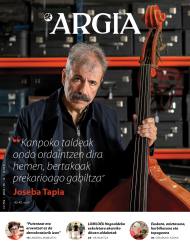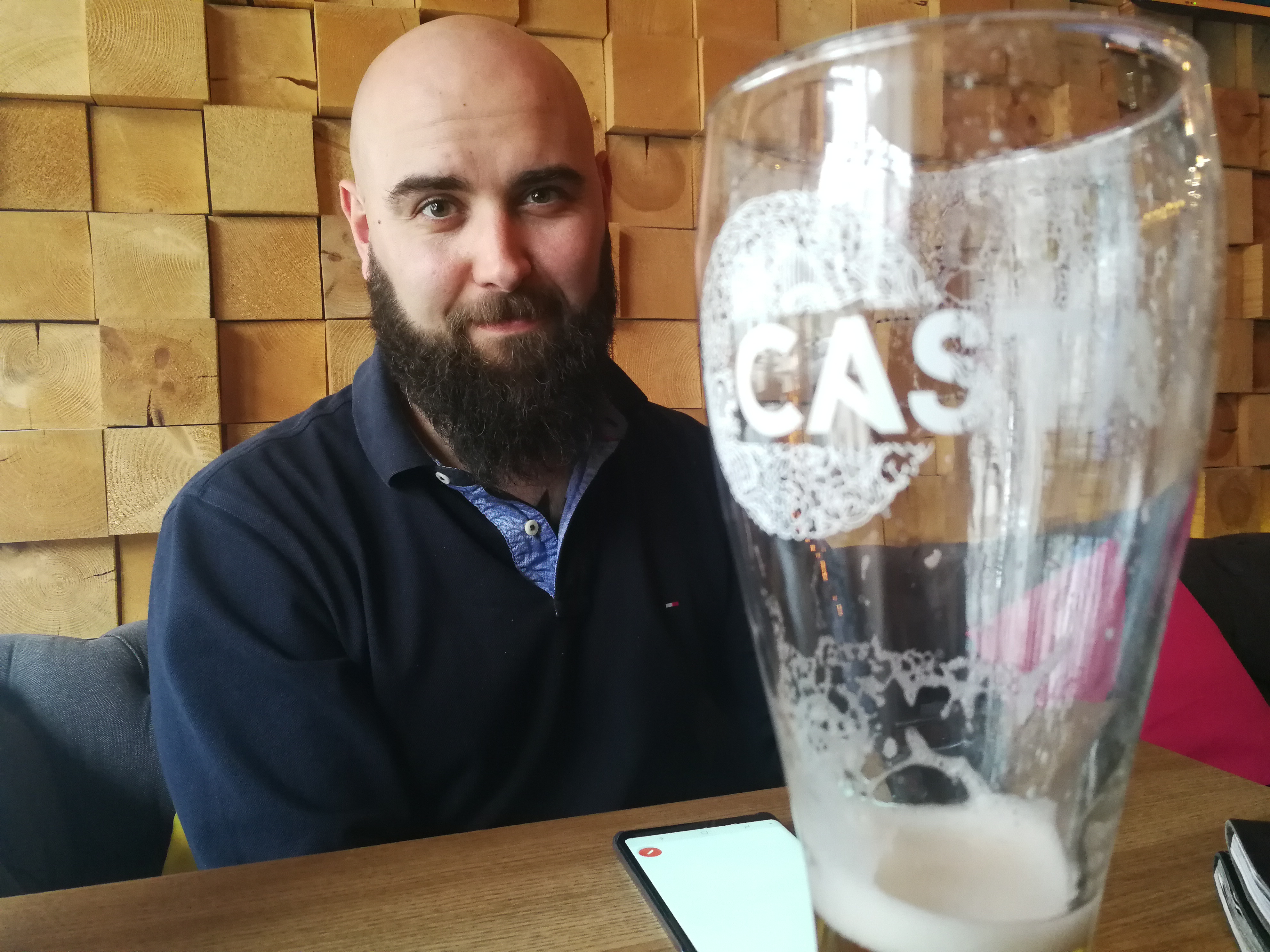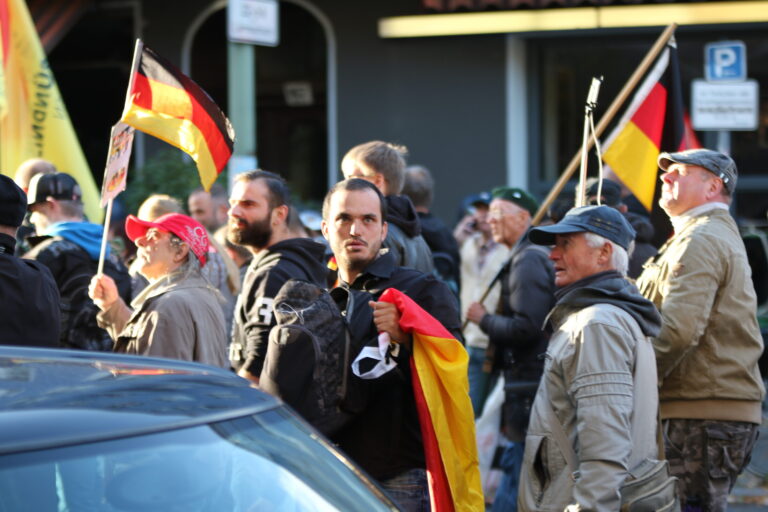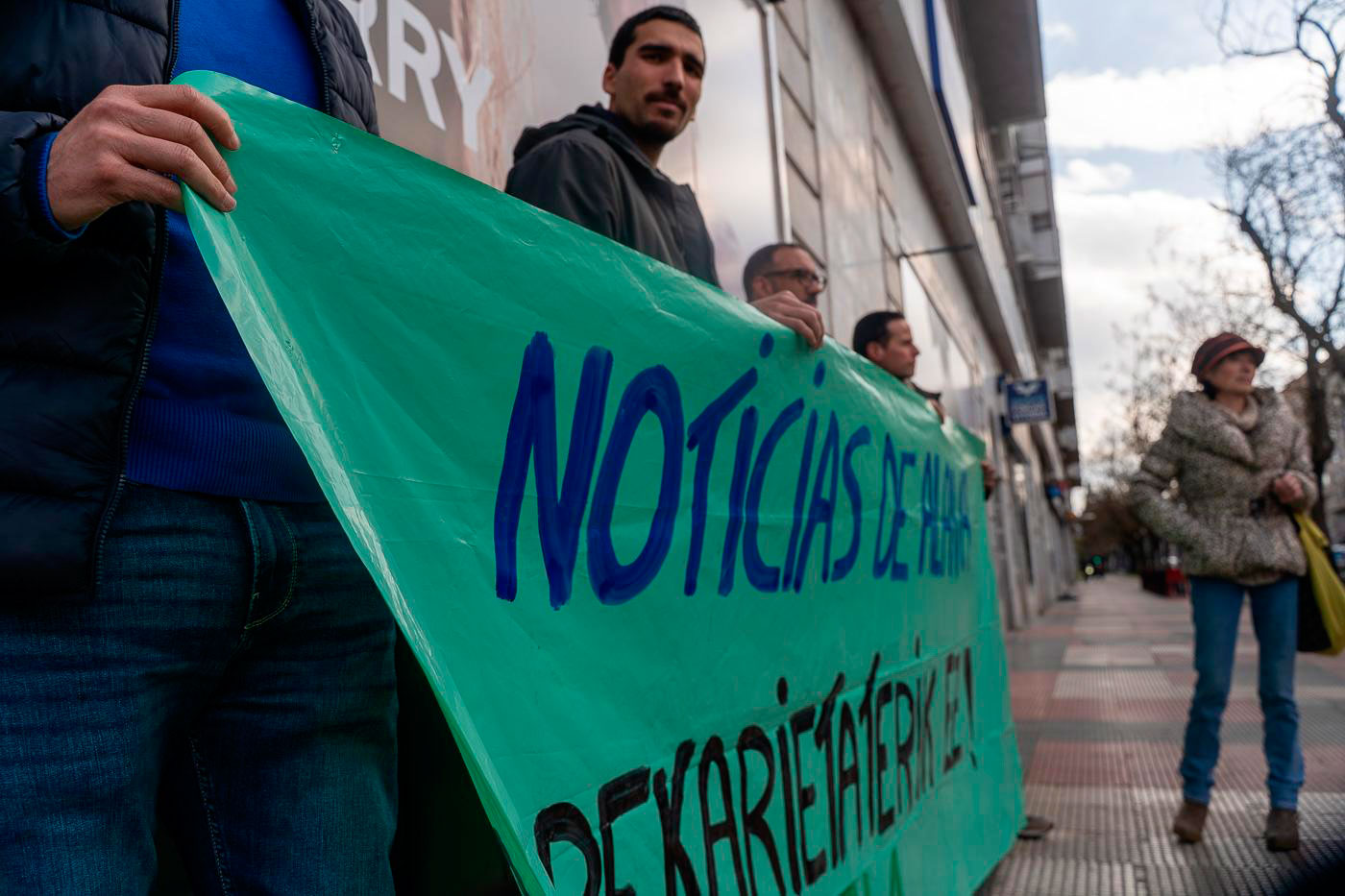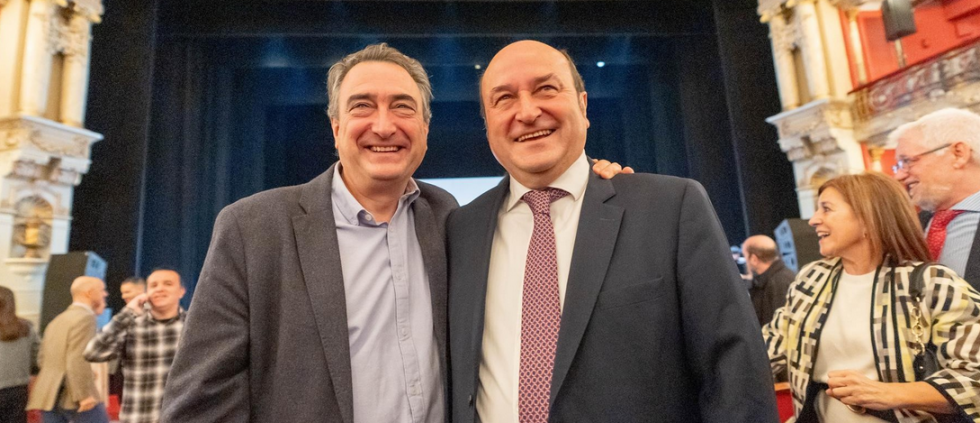"The structure of media ownership determines the form of information"
- Kinguru Schamberger (Munich, 1986) lives with one foot in academia and another in political activism, critically analyzing media action and engaging in political conflicts around the world, paying special attention to the movement for the release of curves. Former member of the German communist party DKP, he appeared last year on Die Linke's lists in the federal elections in southern Munich. He also knows the harassment of his political position. Among other things, in 2016 the secret services tried to prevent Ludwig Maximilian from giving her a job, arguing that she was a communist. In May of this year he spoke with ARGIA about the conference “Property, media, public” organized by the KriKoWi network in Vienna.

From system to network: media, politics and journalism has just published in German the book of Kurdistan. After hearing the explanations of ARGIA at the conference organized by KriKoWi, he observed similarities between the curved and the Basque media. What do they look like?
Both the Basque media and the Kurds are created by oppressed peoples, by people who have their culture and language crushed. Therefore, curvo or Basque journalism is always a form of resistance to oppression and assimilation. And that means that both Kurdish and Basque journalists are always seen as political people. They're doing journalism, not just because they want to be journalists in a bourgeois way, but because they see that work as an opportunity for resistance and criticism. They obviously use the values and principles of journalism, but they are also closely linked to the identity of the oppressed people. In that, for example, I see similarities. There may also be many others, the Vasco-speaking and Kurdish media have suffered and suffer from high-level state harassment. The Kurdish media are illegalized almost every week, they get into the houses of journalists, put them in jail, take out licenses to prevent their publication, the state blocks websites... And you talked about the "black day of Basque journalism," what year was it in February?
... in 2003 [ARGIA spoke at the conference on the closure of Euskaldunon Egunkaria].
That is the black day of Basque journalism. The Kurds also have their own thing. However, as mentioned above, the expression before them remains a form of resistance: "No, I'm a Basque journalist; no, I'm a curved journalist and I'm going to keep writing in my language, I'm going to keep writing about my political ideas."
As part of his family of Turkish origin, how did he achieve political solidarity with the Kurds?
To begin with, I consider myself a communist and as a communist I have no homeland, first of all, I am an internationalist. That is why I stand in solidarity with the oppressed peoples of the world. Not only with the Kurds, also with the Basques, which I have been there, or with the Western Saharawis, with those of the Polisario Front, but also with the Palestinians, who are also crushed by Israel. Internationalism is one of the central elements of my political identity. My family is also Turkish. I come from a country oppressed by the Kurdish 30-40% of the population. And I believe that the duty of someone who comes from the people of oppressors is to show solidarity with the oppressed. Finally, I am particularly interested in the Kurdish liberation movement, because it is a politically left-wing and socialist movement, capable of advancing and developing its political ideas after the sharp fall of the Berlin Wall in 1989. At that time many national liberation movements entered into crisis and also the Kurdish liberation movement, but they were able to reinvent themselves and build an ideology that I consider to be 21st century socialism: democratic confederalism, democracy for advice, ecology and women’s rights in particular, through feminism. It is also politically interesting to note the Kurdish movement.
"Kurdish and Basque journalists always see themselves as political people"
This solidarity has led him to have problems in Germany, such as fines for the display of flags of the Kurdistan Citizen Protection Units (YPG and YPJ) at the demonstrations. Sometimes national liberation movements are presented as local problems; does persecution in Germany demonstrate the global dimension of the problem?
Yes, clearly. The Kurdish liberation movement is not a nationalist struggle, but a global fight for solidarity, equality and emancipation. That is why NATO members, not just Turkey, but Germany and other European countries, are fighting against such ideas so that they do not spread throughout the world. They try to prevent it. And Germany is at the forefront of this struggle: if you look at history, it has had many years of collaboration with the Turkish state. Both sides benefit from this relationship, especially in the economic field, but also in the political sphere. In 1993 Germany banned the CCP (Kurdistan Workers’ Party), assuming the definition of terrorism by the State of Turkey. Since then, many forms of solidarity with the Kurdish liberation movement have been pursued in Germany. You mentioned an example: The display of the flags of YPG and YPJ wanted to be removed by law, although they finally failed. But before they took me to court several times, and the police came into my house one morning, took my computer, my phone, etc... And I am under the supervision of the German secret services. Not only do I, of course, also many other Kurdish colleagues; in general, many people participating in solidarity groups. In addition, when I had the opportunity to work at Munich University, the secret services intervened and said to the university: "They cannot give work to someone like Kaldeko, who is a communist and is close to the liberation movement of Kurdistan. It's the enemy of our constitution." It is within this framework that the issue stands. The struggle was long, lasted six months, but public solidarity was so great that eventually the university had to give me work.
Many of us who were familiar with this issue had an echo in the international press. The intervention of the secret services in the academic field is striking.
Yes, it is. I actually consider myself a mixture of two areas: the activist and the scholar. This is not very common in German universities, but I think it's very important to be connected to social movements, and to work at the same time in college to support those struggles from an academic point of view.
.jpg)
Is the university therefore a battlefield?
Yes, of course. The ideological hegemony of the capitalist State occurs, among other things, in the university. We are talking at the Economic University of Vienna and many neoliberal thoughts occur here. We must resist, both from the outside and from within. So we created the Critical Communication Research Network (KriKoWi), because we wanted to make the field of communication sciences more critical with capitalism, patriarchy and all kinds of oppression that underpin our current society. And of course, the state also wants to prevent it because it wants a society that aligns with its ideas and beliefs.
"I and many other Kurdish colleagues are under the gaze of the German
secret services"
Much has been said in these days in Vienna about media ownership. It's not a recurring theme. Do you think that the association of European media that think in a similar way about this issue can help to reorient the debate in this area?
I would say yes. In general, in communication studies and within the media, the issue of ownership is a kind of blind angle that nobody seems to remember. But as a Marxist, I think ownership is what structures society. And the structure of media ownership conditions how journalism is done, how things are counted. That is why it is very important to keep this issue in mind and discuss it critically. That's why we've invited ARGIA, among other things, to explain your case, but also to meet you, to know you personally and to be in touch. I think we have to think about the different media ownership models. ARGIA is a very interesting model, because it seems to me that you want to build a utopia within capitalism, a small rupture within capitalist structures. That is something I fully support.
The days have, in any case, included sceptical views with the media on the left. Baricada, Boyan Stanislavski, pointed out that he sees "many generals" – too many communication projects of one or two people – while "soldiers" are few. What do you think?
It may be a very militaristic description [laughs], but I think we've all understood what it meant. My utopia could be something like left-wing Google News starting at European level. Because there are many left-wing or progressive media in Germany, Austria, Euskal Herria, Spain, France, etc., besides doing a very good journalism, analyzing things critically, politically, economically ... But very few people know it. You can have a reader of 20,000 people, another of 10,000... And in that context, I imagine a left-wing media search engine in which all those media would show their contents; and if you are looking for news about the arrests, or one of the ecologist protests, you can see news about movements across Europe on these issues. It would be a beginning. Of course, we should think about how to fund it, and it would be essential to translate articles, because I cannot read in Basque, you cannot read in Turkish... But I imagine that network of left-wing media, knowing that there will also be political differences, but that is the situation on the European left today, so we have to work on it.
Apirilaren 24an, ETB1ean, jendeak aspalditik eskatzen zuen programa eredu bat estreinatuko da: Linbo, late night formatuko ordubete inguruko saioa, gazteek eta gazteentzat egina.
"Ask for your turn and we'll join you," the willing and cheerful announcer who speaks from the studios tells the young correspondent who walks through the streets of Bilbao. The presenter immediately addressed the audience. "In the meantime, we are going to Pamplona..." They opened... [+]
I have to confess a sin here. Four years ago, I introduced a new habit into my life: on Sunday nights, I began to watch the ultra-right television channel CNews, which spreads continuous "information" like a cannon of shit. What was at first half an hour a week, has at any given... [+]
Martxoaren 14an Donald Trumpek agindu exekutibo bat sinatu zuen, hainbat berri agentziak jasotzen duten diru kopurua asko murrizteko. Kaltetuetako bat United States Agency for Global Media (USAGM) izan zen eta, ondorioz, Voice of America (VOA), Radio Free Europe/Radio Liberty... [+]
2022ko ekainaren 7an, Directa-k serie luze bateko lehen polizia infiltratuaren kasua argitaratu zuen. Martxoaren 5ean, Belen Hammad fikziozko izena erreta geratu zen, polizia-argotean dioten bezala. Jada hamar dira Directa, El Salto eta El Diario-k azken hiru urteetan argitara... [+]
USAIDen inguruko txolopotearen ondoren, espero beharrekoa zen. Baina, hala ere, urte askotan haien jarraitzaileak izan garenok, samin-puntu batekin hartu dugu albistea. Martxoaren 15ean, Trump administrazioak, kolpetik, erabat itxi baitu United States Agency for Global Media... [+]
Varsoviako Barrutiko Auzitegiak argudiatu du González jada ez dagoela Polonian, eta ezin dutela jakin noiz aterako den Errusiatik. Auzitegiak ez du kazetari nabarniztarraren aurkako bestelako prodezurarik abian jarriko.
Gaur abiatu da Bizi Baratzea Orrian kide egiteko kanpaina. Urtaro bakoitzean kaleratuko den aldizkari berezi honek Lurrari buruzko jakintza praktikoa eta gaurkotasuneko gaiak jorratuko ditu, formato oso berezian: poster handi bat izango du ardatz eta tolestu ahala beste... [+]
Alemaniako Poliziak asteleheneko gertakariaren arrazoiak "politikoak" zirela baztertu duen arren, 35 urteko Alexander Scheuermann Ring Bund talde neonaziko kide zen. Bi hildako eta hamar zauritu utzi dituen atentatuaren egileak sare sozialetan "gorroto mezuak"... [+]
Lan baldintzen "prekarietatea" salatzeko kontzentrazioa egin zuten asteartean egunkariaren egoitzaren aurrean. Abenduaren 2tik sindaura greban daude langileak eta mobizlizazioak "areagotzea" erabaki dute orain.
Urtea baino gehiago da Olatz Simonek –EITBko berriemailea Parisen, garaian–, orrialde hauetan bertan ohartarazi zigunetik Bruselak kazetariari lanbideaz erakusten dionaz. Eta halaxe joan gatzaizkio galdezka Amaia Portugali. Bruselan gure irrati publikoak duen... [+]
Langileek salatu dute zuzendaritzak ez diela lan baldintzen gaiari heldu nahi izan eta enpresak nahiago izan duela Gaztea Sariak ekitaldia bertan behera utzi, “horrek sortutako albo-kalte ekonomiko eta sozial guztiekin”, arazoari irtenbidea eman baino.
Joan den asteartean La Vanguardia-n argitaratutako artikuluan egin zuen proposamena Txema Montero abokatu bizkaitarrak. 30 urtez Deia egunkariko kolaboratzailea izan da eta lehenik hara bidali zuen bere artikulua, baina egunkariak ez zion argitaratu.









